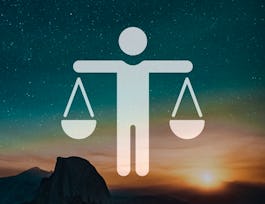Welcome to Ethics of Communication. Geared toward working professionals in both the corporate and nonprofit sectors, Ethics of Communication covers key topics in the modern world of business. Areas of focus include an in-depth examination of the ethical dimensions of professional communication, self-examination of individual conflict styles and preferences, and crisis management scenario analysis and strategy. You will develop and enhance skills related to these concepts through lectures conducted by Notre Dame Professor, Dr. Amanda G. McKendree, written communication exercises, self-reflection, peer-graded assignments, and a variety of readings.



Ethics of Communication
This course is part of Ethical Leadership Specialization

Instructor: Dr. Amanda G. McKendree
Sponsored by IEM UEM Group
3,417 already enrolled
(54 reviews)
Skills you'll gain
- Corporate Communications
- Interpersonal Communications
- Communication
- Governance
- Conflict Management
- Crisis Management
- Business
- Strategic Communication
- Organizational Leadership
- Communication Planning
- Business Management
- Active Listening
- Business Communication
- Leadership and Management
- Team Management
- Ethical Standards And Conduct
- Business Leadership
- Communication Strategies
- Business Ethics
- People Management
Details to know

Add to your LinkedIn profile
18 assignments
See how employees at top companies are mastering in-demand skills

Build your subject-matter expertise
- Learn new concepts from industry experts
- Gain a foundational understanding of a subject or tool
- Develop job-relevant skills with hands-on projects
- Earn a shareable career certificate


Earn a career certificate
Add this credential to your LinkedIn profile, resume, or CV
Share it on social media and in your performance review

There are 4 modules in this course
This week, you will begin to learn how to adopt a communication ethics literacy mindset and address the question, “What is communication ethics?” You will be guided through a self-analysis of your own values through video lectures, activities, and peer-graded exercises. You will also learn to use communication ethics terminology.
What's included
6 videos13 readings3 assignments1 peer review1 discussion prompt
This week is structured according to three learning objectives. The first objective will encourage you to reflect on your own values related to listening in personal and professional settings through summative reflection. The second learning objective will guide you through distinguishing between different listening types through a summative reflection assignment. The third learning objective asks you to create an action plan for improving your listening skills through a peer discussion.
What's included
6 videos11 readings6 assignments1 discussion prompt
This week has three primary components: (1) Assessing organizational/professional communication in conflict scenarios, (2) considering your own preferred style of conflict communication, and (3) planning strategic communication responses, including using appropriate tools to respond.
What's included
5 videos13 readings3 assignments1 peer review
This week's topics explore the dynamics of managing a crisis in a digital communication era with an integrated crisis communication framework. You will examine major scholars and crisis resources, and document your understanding of crisis communication ethics through a crisis scenario response. You will explore the major concepts and theories of crisis communication, identify best practices for creating crisis messages, and articulate the meaning and practice of communication ethics for crisis events. There will be one cumulative peer-graded assignment to assess your knowledge of all the learning objectives in this week. While completing this assignment, you will apply crisis concepts and devise strategies for communicating with various stakeholders. Acquiring these new interpretation skills will strengthen your responses to crisis scenarios and reinforce your understanding of the crisis planning and managing phases, as well. Additionally, you will learn about the primary components and definitions of crisis and differentiate between risk, problem, disaster, and paracrisis. You will use your new interpretation skills to shape responses to crisis scenarios using technology tools.
What's included
7 videos9 readings6 assignments1 peer review
Instructor

Offered by
Why people choose Coursera for their career




Learner reviews
54 reviews
- 5 stars
88.88%
- 4 stars
9.25%
- 3 stars
1.85%
- 2 stars
0%
- 1 star
0%
Showing 3 of 54
Reviewed on Oct 31, 2022
This is a great course to enhance consciousness within leadership roles and therefore highly recommended!
Reviewed on Oct 23, 2022
Learned to think much more clearly about my public communication in public-facing leadership.
Reviewed on Feb 15, 2024
Increased my awareness regarding technology. Excellent course.
Recommended if you're interested in Business

University of Michigan

Duke University

University of Colorado Boulder

Rice University

Open new doors with Coursera Plus
Unlimited access to 10,000+ world-class courses, hands-on projects, and job-ready certificate programs - all included in your subscription
Advance your career with an online degree
Earn a degree from world-class universities - 100% online
Join over 3,400 global companies that choose Coursera for Business
Upskill your employees to excel in the digital economy


